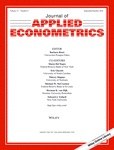
Gardberg, M. and Pozzi, L. (2022). Aggregate consumption and wealth in the long run: The impact of financial liberalization Journal of Applied Econometrics, 37(1):161--186.
-
Affiliated authorsMalin Gardberg, Lorenzo Pozzi
-
Publication year2022
-
JournalJournal of Applied Econometrics
This paper investigates the impact of financial liberalization on the relationship between consumption and total wealth (i.e., the sum of asset wealth and human wealth). Financial liberalization is persistent and may signal changes in expected future consumption growth rates and/or in rates of return on wealth that, through the intertemporal budget constraint, affect the current consumption–wealth ratio. We estimate the long-run relationship between consumption, total wealth, and financial liberalization by state space methods using quarterly US data. The results show that the trend in the consumption–wealth ratio is well-captured by our baseline liberalization indicator. We find that the increase in this indicator over the sample period has increased the consumption–wealth ratio with about 10%. Investigating the responsible channel, additional estimates show that financial liberalization has predictive power for aggregate consumption growth rather than for returns, a result that supports an incomplete markets interpretation of the link between liberalization and the consumption–wealth ratio.